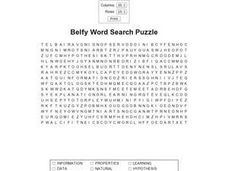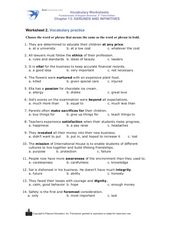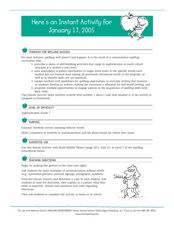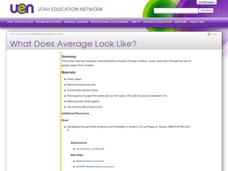Curated OER
Belfy Word Search
In this language arts worksheet, students study 20 words in a word bank, then locate them in a word search puzzle. The words appear to be related to chemistry but the meaning of the title is not known.
Curated OER
Vocabulary Practice: Words That Mean the Same
In this synonyms worksheet, students read ten sentences and analyze the words in bold. From three choices, students choose the word or phrase that means the same as the word in bold.
Curated OER
High Frequency Word Scavenger Hunt
First graders participate in a word scavenger hunt. They practice saying and identifying letters. They work together to help each other.
Curated OER
The Meaning of Fractions
For this fractions worksheet, students complete different kinds of fraction problems. Students complete 50 problems total where they solve, shade, and put numbers into a chart.
Curated OER
Sight Word Matching
Students explore English by participating in a match game. In this sight word vocabulary lesson, students read the book The Cat's Surprise and identify the sight words which they are unfamiliar with and need to review. Students identify...
Curated OER
What Makes Us Different?
Students read the book "Tacky the Penguin," and examine how they are different from each other. They discuss what makes Tacky different from his friends, develop a list of ten ways they are different from one another, and examine how...
Curated OER
Symbols Communicate Without Words
Students write different symbols we use in writing out in their word form. In this word symbols lesson plan, students practice writing out what the symbols represent. For example the symbol % stands for 'percent'.
Curated OER
It All Began With a Bean
Students explore human anatomy by participating in hands-on activities. In this digestive system lesson plan, students read the book It All Began With a Bean and discuss the process of food digestion in our body. Students utilize soda...
Curated OER
What Does Average Look Like?
Fifth graders explore the concepts of range, median, mode, and mean through the use of graphs drawn from models. They use manipulatives to represent data they have collected within their groups, and compare the differences between mode,...
Curated OER
Polar Bear Literacy Activity
Young scholars generate vocabulary words synonymous or related to "noise." In this literacy lesson, students listen to the book Polar Bear, Polar Bear, What do You Hear? by Bill Martin and Eric Carle and discuss the meaning of vocabulary...
Curated OER
Data Analysis and Probability
Students make their own puzzle grid that illustrates the number of sit-ups students in a gym class did in one minute, then they make a histogram for this same data. Then they title their graph and label the scales and axes and graph the...
Curated OER
Adventure Writing: Oregon's Landscape as a Setting
Students identify geographical features of different regions encountered by migrants on the Oregon trail. Students research how the Oregon landscape may have affected life and 19th century westward migration. Students write a narrative...
Curated OER
Coming to Terms With Cultural Differences
Students discover that it is possible to be challenged and "culture-shocked" by the norms of one's own culture when returning home from having been away and living in another culture. They examine and compare the customs of modern...
Curated OER
Sound It Out
Unfortunately, the worksheet that is the focus of this instructional activity is not functioning properly. You can, however, use the Scholastic Children's Dictionary page attached to explore the dictionary with your elementary and middle...
Lawrence Virtual School
Context Clues
Considering a lesson on using context clues to figure out the meaning of unfamiliar words? This packet includes a brief reading passage about strategies readers can use and 12 very different graphic organizers, including a template for a...
Southern Nevada Regional Professional Development Program
“Double Double Speak Speak”
Bilateral suborbital hematoma? Call an audible? 404? Have fun with “the twittering or warbling of birds,” or as 14th century French speakers would say, have fun with “jargon.” Groups match specialized jargon with plain speech, decode...
Curriculum Corner
“I Can” Common Core! 3rd Grade Language
Support third graders with developing their language skills using this Common Core checklist. With each standard written as an I can statement, children are given clear learning goals to work toward throughout the year.
Houghton Mifflin Harcourt
Off to Adventure!: English Language Development Lessons (Theme 1)
Give language skills a boost with a series of ESL lessons in an Off to Adventure! themed unit. Using a speak, listen, move, and look routine, scholars enhance proficiency through grand conversation and skills practice. Discussion topics...
Houghton Mifflin Harcourt
Nature Walk: English Language Development Lessons (Theme 2)
Walking in nature is the theme of a unit designed to support English language development lessons. Scholars look, write, speak, and move to explore topics such as camping, woodland animals, instruments, bodies of water, things found at a...
Curated OER
What is an Atlatl?
Let's go an an archaeological dig! Prepare your kids with a list of vocabulary terms relating to archaeology, including different types of items that one might find. They study pictures of each item and play a memory game based on the...
Curriculum Corner
7th Grade ELA Common Core Checklists
Track your class's progress on all of the ELA Common Core standards with these handy charts. Along the left side, each seventh grade identifier is listed along with the full text of the standard. As you teach, reteach, assess, and...
Pearson Longman
Emotions Reading
Explore the many types of feelings and how people express them with a lesson compiled of kid-friendly activities that spark critical thinking, self-reflection, and reinforce language and writing skills. Scholars delve into the variety of...
Goodwill Community Foundation, Inc.
Expressing Yourself
¿Cómo estás? ¿Estás feliz? ¿Tiene calor? Beginning Spanish speakers practice expressing their physical feelings, state of mind, and confusion with a helpful vocabulary exercise.
K12 Reader
The Important Apostrophe: Their, They’re, and There
They're going to be there with their family. Class members practice using and identifying the correct use of they're, there, and their with a skills practice worksheet. The top half of the worksheet gives brief background information on...

























